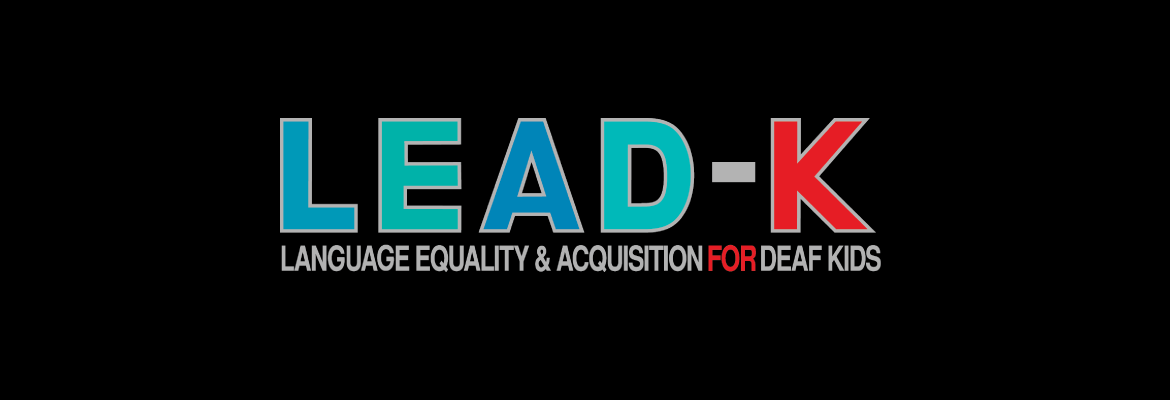
Since Michigan’s LEAD-K bill was signed into law as Public Act 256 in 2022, dedicated committees have been working to bring its vision to life.
Language Equality and Acquisition for Deaf Kids (LEAD-K) is a national initiative designed to provide language acquisition resources for parents and guardians of young children who are deaf or hard of hearing (DHH). The goal is to ensure that all children who are DHH develop a strong language foundation and are prepared for kindergarten. In Michigan, the Michigan Department of Education Resource for Deaf/Hard of Hearing (MDE RDHH) has been tasked with overseeing the implementation of this legislation.
Public Act 256 calls for an advisory committee, including members in specifically defined roles, to guide the development of resources identified in the legislation. The committee began meeting in February 2024 and has focused on identifying recommended tools and assessments for educators to use with students. The committee has also been compiling information and developing language milestones for a new LEAD-K parent resource, which will be ready this summer.
In anticipation of the upcoming resource, MDE RDHH will host three in-person regional events this summer to raise awareness about LEAD-K and its implementation in Michigan. Additionally, training sessions will be offered this fall for school personnel on the use of assessments outlined in the LEAD-K recommendations.
A few committee members recently shared their reflections on the work so far:
Freida Morrison, LEAD-K Michigan Spokesperson
I come from a fourth-generation deaf family. I worked in the school system for more than 30 years, and I saw absolutely no improvement—nothing got better in Deaf education.
People on the committee come from diverse backgrounds—some are professionals, some are parents. And they do have a commonality: they want to see language improve for children. We do share that, and we really listen and respect each other.
LEAD-K is focused on birth to five. That’s the window of opportunity to actually absorb, acquire, and learn. If it’s later than that—when kids get to school, when they’re seven or eight years old and learning the language—they’re going to have a language delay for the rest of their lives. I’m super excited to see this happening, because parents will be more aware, and more parents will have the resources they need.
Rebecca Lozar, DHH Teacher, Bloomfield Hills School District
Being a teacher of the deaf not only is my profession, but being raised by deaf parents is part of my life as well. And having been in deaf education for so long, unfortunately there are still so many barriers that haven’t changed, especially since my parents were in school. Even to be given the opportunity to try our best to change things, adjust things, and make them better in any capacity was something I just had to be a part of.
I think the biggest thing we need is continued awareness. I’m hoping that LEAD-K brings about the awareness of deaf children and their language acquisition, and that ASL is looked at on the same high level as English—that our students can achieve the same as those who use spoken English. This isn’t new, but I do think this will bring it back to the forefront.
Each child has to lead us in terms of what works for them. Give them every opportunity, in both ASL and English, and as their language grows, we’ll be able to help set their path when we see what’s working for them. It needs to be child-led, not adult-led.
Gina Cooper, Program Coordinator, Early Hearing Detection and Intervention Program
This work is connecting people and experts across the state, and I think that connection will continue even after the work is done. I think just getting everyone together, talking, and sharing their expertise is going to have even further reaches than just the work that's being done here today.
Language is so important. It has social, academic, and developmental implications. It’s something that has to be fostered and supported in kids who are deaf or hard of hearing so that they can reach their full potential.
Tori McIntosh, Michigan Hands & Voices
I’m the parent of a deaf child. I understand how overwhelming it can be to find out that your child has a hearing difference, and the need for support and resources, because it is such a new world to most of the families we work with.
Being somebody who has walked that path, I’m really grateful for the opportunity to be that voice at the table and work alongside professionals. We all have our own expertise and our own part to play, and I’m very grateful that parents have a seat at that table—parents with a variety of experiences and perspectives—to provide that insight.
We have an opportunity to improve the services that already exist in our state—to make them better, more comprehensive. I’ve been able to share what would have helped me, what worked, what didn’t work, so those coming after us can have better experiences.
I’ve really benefited from building relationships with people in the community that I didn’t know before. We are all learning from each other, and I think that’s the best part of this.
